
Koppel tells Democracy Now!, “I don’t think an apology is due. If what you are saying is could we all have been more critical? I think the answer is yes.” [includes rush transcript]
One of the opportunities these conventions provide is the chance to ask questions of people we normally don”t have access to. And it”s not just the politicians. There are some 15,000 journalists crammed into the FleetCenter. America”s most recognizable newspeople roam the halls. Some, like Sean Hannity of the Fox News Channel, have their own security details. Yesterday, we caught up with Ted Koppell, the host of ABC’s NightLine. And we asked him about the Network news coverage of the build-up to the invasion of Iraq.
Transcript
AMY GOODMAN: Do you think that the ABC and the other networks should apologize for providing an uncritical forum for the administration to lay out their unsubstantiated claims of weapons of mass destruction?
TED KOPPEL: I am glad you phrased your question so nicely. No, I don’t think an apology is due if what you are saying is could we all have been more critical? I think the answer is yes. I must tell you, I am going to be responsive in behalf of Nightline over which I do have some control. We did do a 90-minute town hall meeting, the title of which was Why Now? and the essence of which was: Where is the evidence that there’s an immediate danger to the United States? Did we do enough programs like that? I concede we did not. But that’s a function of perhaps incompetence on my part, but certainly not ill will and I will try and do better the next time, but I don’t think I need to apologize for it.
AMY GOODMAN: A study of the two weeks around Colin Powell giving his address at the U.N. for war looked at the four major nightly news casts ABC, CBS, and NBC and the PBS News Hour with Jim Lehrer. Of the 393 interviews done around war, only three were with anti-war representatives. Now this was at a time when about half of the population was opposed to the invasion wanting more inspections and diplomacy. So that did not reflect mainstream America at all.
TED KOPPEL: No, but I, you know, where is it written that it is a journalist’s responsibility to go check the polls every day and see what mainstream America wants them to do?
AMY GOODMAN: No. But three of almost 400 interviews were anti-war representatives? That is so skewed to the pro-war voice.
TED KOPPEL: Right. I agree with you. But I must ask you in return, what was, you know, what would you have looked to for evidence that there were no weapons of mass destruction? There was evidence in 1998 that those weapons of mass destruction, not only existed, but were present in, just let me finish the plot—not only existed, but were present in Iraq. It did not make logical sense that Saddam Hussein, whose armies had been defeated once before by the United States and the Coalition, would be prepared to lose control over his country if all he had to do was say all right, U.N., come on in, check it out, I will show you, give you whatever evidence you want to have, let you interview whomever you want to interview. Logically at that time, it seemed as though weapons of mass destruction—did I believe at the time that there were weapons of mass destruction? Absolutely, I did.
AMY GOODMAN: Well let me look at September 2002. Bush and Blair have they are news conference at Camp David. They say an I.A.E. report has just come out that alleges that Saddam Hussein will get nuclear weapons within six months.
TED KOPPEL: Yeah.
AMY GOODMAN: This was six month away before the invasion.
TED KOPPEL: Sure.
AMY GOODMAN: Almost no mainstream reporter in this country reported, there was no such report.
TED KOPPEL: I can take you back to 1990 for example when the evidence from the CIA was that there was no indication that the Iraqis had any kind of a nuclear program. After the war, they found all kinds of evidence.
AMY GOODMAN: But they were citing an IAE report that didn’t exist. Then what about the son-in-law of Saddam Hussein? He said, he was quoted repeatedly by the press when they like what had he said. When he was anti-establishment, when he said we have no—we destroyed the weapons of mass destruction after the Gulf War, then the press did not pick up on this. I mean—if these kinds of issues were the voices they would cite for other issues.
TED KOPPEL: I am saying to you— I mean we can go around this as often as you like.
AMY GOODMAN: Let me ask a bigger question.
TED KOPPEL: Well if you are going to let me answer the first one before you ask me the next one.
AMY GOODMAN: Okay.
TED KOPPEL: I am saying to you that it did not make any sense that Saddam Hussein would run the risk of being overthrown; of losing all the power that he had, if, indeed, in 2003 he had no weapons of mass destruction. Why in the heaven’s name did he not permit the kinds of inspections and the kinds of interviews that would have demonstrated that to the world’s satisfaction? I am not seeing that now I believe there were weapons of mass destruction immediately before the war. But I can understand why our leaders and why many of us in the media were inclined to believe that at the time.
AMY GOODMAN: Do you support the network’s policy, ABC and the others, of splitting military officials—
TED KOPPEL: Don’t, we will do two more—having asked for one question, you are now in yourself ent.
AMY GOODMAN: And then I will give you a book as a reward.
TED KOPPEL: Thank you.
AMY GOODMAN: Do you support the networks policy, including ABC’s, of putting retired generals, other military officials on the payroll, yet not putting peace activists on the payroll?
TED KOPPEL: Yes, I do.
AMY GOODMAN: Why?
TED KOPPEL: I do. Because I think there’s a certain level of expertise that comes with having been, for example, a four-star general where we have Richard Clark, let’s say, is one of our paid consultants on ABC. I wish that we could go back to the days of, I guess about 10, 15 years ago, when it was network policy that we didn’t pay anybody to come on and express his or her point of view. Unfortunately, we live in such a competitive environment that everybody now expects to be paid. Why should a peace advocate expect to be paid for expressing a point of view without any—I mean if you are talking about someone who has extraordinary expertise, in a particular area, but you would have to be a little more specific about who, for example you had in mind.
AMY GOODMAN: The Pentagon would put out their point of view for free. Why pay one side? Because more often than not the generals are commenting on whether or not we need to go from air war to ground troops moving in…
TED KOPPEL: Once a general, I mean my experience has been that once a general is out of uniform and no longer in the Pentagon, is he a little more free to discuss aspects of a policy than he was when he was within the pentagon. But if what you are saying to me is do I wish we know longer paid experts at all? You bet. I think everybody ought to come on television for free the way I’ve just done for you. All right?
AMY GOODMAN: But when you keep these kind of commentators on a regular basis, you end up with a pro-war—they are continually doing the play by play and you don’t have the—
TED KOPPEL: On the contrary. I think for example, and he’s not within of our paid expert, but you have Wesley Clarke who quite clearly has opposed the war over the past few months.
AMY GOODMAN: Not quite clearly before the invasion.
TED KOPPEL: Not quite clearly before the invasion. But again, I mean it’s not necessarily always true. But because someone is a four-star or was a four-star general, that he opposes or supports war.
AMY GOODMAN: But three of almost 400 interviews done around war being pro-war, that’s a serious problem.
TED KOPPEL: As you told me.
AMY GOODMAN: That was Ted Koppel of ABC’s Nightline just outside the Fleet Center.

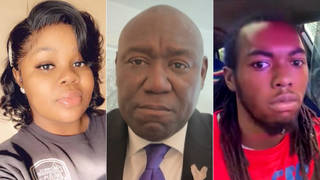
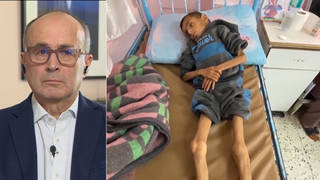
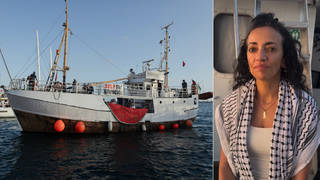
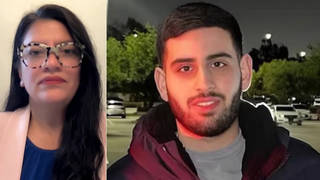





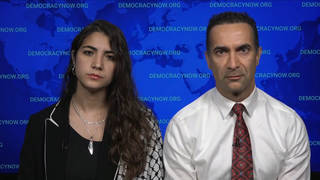

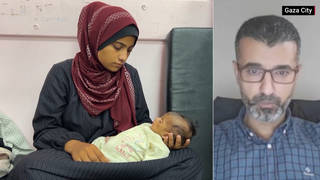
Media Options